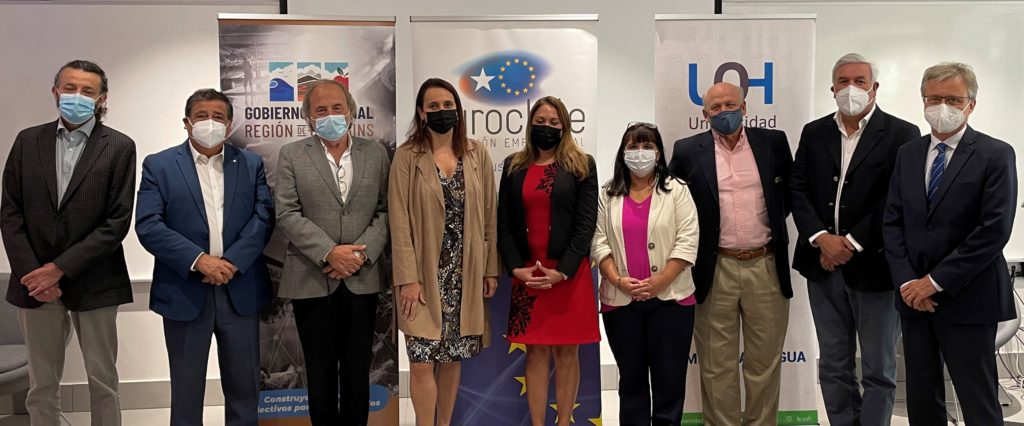Circular Economy Conference in the O’Higgins Region: specialists share regional and European experiences to respond to the effects of climate change and water scarcity in the agricultural sector
The Circular Economy Conference: A sustainable and circular agriculture from the O’Higgins Region for Chile was held at the premises of the University of O’Higgins in Rancagua. During the event, organized by the Eurochile Business Foundation and the Regional Government with the support of the European Commission, different national and European experiences of implementation of circular economy and sustainable development were presented.

The conference, which brought together an audience of more than 100 online and 30 in-person attendees, had as speakers the director of the Research Institute of Organic Agriculture in Europe (FiBL), Miguel de Porras, who presented the living laboratories and infrastructure project research; the General Manager of the Belgian innovation cluster Wagralim, François Heroufosse, who addressed how the beer industry has reused its waste; and the director of the Center for Advanced Studies in Fruit Culture of O’Higgins (CEAF), Mauricio Ortiz, who referred to the genetic improvement programs that work to face the consequences of climate change in the region.
“As countries with greater progress in sustainability have shown, this is a systemic challenge. The circular economy is about a production that reduces the use of virgin raw materials and consumption, innovation and intensive use of technologies” expressed Vicente Caruz, president of Eurochile, who valued the possibility of having the participation of national and European cases because “environmental sustainability and climate change are global problems that cannot be solved by a single actor. Coordination and collaboration between countries is essential, as well as the diffusion and transmission of technologies and experiences”.
The O’Higgins Region contributes 20% of the agricultural GDP in the country, concentrating 27% of fruit crops, 14% of vegetables and 34% of corn. Among its main products it has 47% of cherry plantations and 71% of nectarines; In addition, it has almost half of the harvest of onion, melons and watermelons in the country.
In this sense, the Governor of O’Higgins, Pablo Silva, pointed out that “one of the main sources of economy in the area is agriculture, which is very diverse and ranges from large monocultures to small farmers. We consider it important to collect the experiences that are developed, especially in Europe where they are one step ahead; but also, of our small farmers who have the wisdom to work the field day by day. In this context, we appreciate this instance of knowledge, good practices and experiences so that we can work and develop the circular economy”.
The conference was attended by the Belgian ambassador, Geert Criel, who highlighted the importance of regional governments in the development of the circular economy, “because they are the ones who lead its design and implementation” stressing the need to have the participation of different actors. “First of all, the regional governments set the strategies and offer financing for the development of innovative projects. Then we have private enterprise, a key player without which there could be no lasting change in the economy. Thirdly, innovation and knowledge and, in our country, we have considered it relevant to associate with universities and research centers. Finally, citizens and civil society organizations whose participation is crucial to guarantee the success of the circular economy”.
Shared experiences
The director of the CEAF, Mauricio Ortiz, indicated that agricultural activity is not only affected by the drought of more than 12 years that plagues a large part of the central zone of Chile, but that there are other elements that must be considered, such as the accumulation of hours of cold during the winter, and the increase of temperatures that are experienced during the summer.
To contribute to maintaining the productive capacity of the area, CEAF implements the development of genetic improvement programmes – through rootstock of roots – that seek a better adaptation of plants to local conditions. This has been carried out in stone fruit trees, cherry trees, walnut trees, among other trees, whose production trials are located in the towns of Rayentué, El Tambo, Águila Sur and the El Carmen Agricultural School.
François Heroufosse, the manager of Wagralim, the Belgian Agro-Food Innovation Cluster, spoke about the experiences of the beer industry in his country using the grains discarded from production both in livestock feed and in products such as cookies and pasta.
In the potato industry, they transform by-products into fermentation products to create protein for livestock feed. Or in the production of chicory, whose roots are used to produce polymer that will be used as gas and water to generate energy; in addition to the refinement – through biorefineries – of minerals that can be returned to the agricultural process.
The event concluded with a panel with: Francisco Duboy, president of the Association of Producers and Exporters of O’Higgins (ASPROEX), Elba Vivanco, director of the Climate-Smart Agriculture Project for the Nilahue Valley. Farmers Association of Lolol and Álvaro Alegría, Manager, from Horticrece who discussed the different experiences of the Nilahue Valley programme and also the production of vegetables in the region with sustainable added value.
